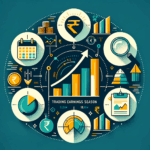Understanding the Impact of Global Events on Share Market Trading in India
In early 2020, as news of a novel coronavirus began to spread, the Indian stock market seemed a world away. Yet, within weeks, the Sensex and Nifty experienced one of the sharpest falls in their history. Similarly, the onset of the Russia-Ukraine conflict in 2022, a war thousands of miles away, immediately sent ripples through Dalal Street, affecting commodity prices and investor sentiment. These instances powerfully illustrate that in our hyper-connected world, the Indian share market does not operate in a bubble. The impact of global events on the share market is a critical factor every investor, from a salaried professional to a small business owner, must understand. This article will break down how international happenings can directly affect your portfolio, providing a clear share market analysis in the Indian context to help you navigate these turbulent waters.
How Global Events Influence the Indian Share Market
To truly grasp why a political development in the US or an economic policy change in Europe can cause your Indian stocks to rise or fall, we need to look at the interconnected channels through which these influences travel. The modern global economy is like a complex web; a tug on one strand is felt across the entire structure. For Indian investors, understanding these connections is the first step toward making informed decisions rather than reacting to fear or hype. The key factors are the flow of foreign money, currency fluctuations, and disruptions in the global supply of goods.
The Globalized Economy: A Chain Reaction
The primary mechanism through which global sentiment enters the Indian market is capital flow, specifically from Foreign Institutional Investors (FIIs). These are large investment funds, like pension funds or mutual funds, based outside of India. FIIs invest billions of dollars in the Indian stock market, and their buying and selling activities have a massive impact on market direction. During times of global uncertainty—be it a financial crisis, a war, or a pandemic—these large investors tend to become risk-averse. They often pull their money out of what they perceive as riskier, emerging markets like India and move it to “safe-haven” assets like US government bonds or gold. This sudden outflow of capital leads to heavy selling pressure, causing benchmark indices like the Nifty and Sensex to fall. This dynamic clearly shows the direct global events influence on Indian share market.
Another critical factor is currency fluctuation, particularly the relationship between the Indian Rupee (INR) and the US Dollar (USD). The USD is the world’s reserve currency, and during global crises, investors rush to buy dollars, strengthening its value. This, in turn, makes the Indian Rupee weaker. A weaker rupee has a mixed impact on Indian companies. For businesses that rely heavily on imports, such as electronics manufacturers importing components or any company importing crude oil, their costs go up, squeezing their profit margins and potentially lowering their stock price. Conversely, for export-oriented sectors like Information Technology (IT) and Pharmaceuticals, which earn their revenue in dollars, a weaker rupee is beneficial. Their dollar earnings translate into more rupees, boosting their profits and making their stocks more attractive.
Finally, we cannot ignore the role of global supply chains. The modern economy relies on a “just-in-time” manufacturing process where components are sourced from all over the world. A global event can easily disrupt this delicate balance. For instance, geopolitical tensions in Taiwan, the world’s largest producer of advanced semiconductors, could lead to a chip shortage. This would directly impact Indian automobile and electronics companies, forcing them to halt production or face higher costs. This disruption in operations would quickly reflect in their quarterly earnings and, consequently, their stock prices. The COVID-19 pandemic was a masterclass in supply chain disruption, showing how lockdowns in one country could create shortages and price hikes across the globe.
Key Global Events and Their Direct Impact on Stock Trading
While the channels of influence are important, it’s equally crucial to understand the specific types of global events that act as triggers. These events can be broadly categorized into economic data releases, geopolitical tensions, and unforeseen crises like pandemics. Each has a unique way of affecting investor sentiment and market performance.
Economic Triggers: The Numbers that Move Markets
Some of the most significant global events are not sudden crises but scheduled economic announcements from major world economies. These numbers provide a health check of the global economy and dictate the flow of money.
- US Federal Reserve’s Interest Rate Decisions: The decisions made by the US central bank, the Federal Reserve (Fed), are arguably the single most-watched economic event for global markets. When the Fed raises interest rates to control inflation, it makes investing in US bonds more attractive and safer than investing in equities in emerging markets like India. This prompts FIIs to sell their Indian holdings and move capital to the US, causing our markets to decline. The mere hint of a future rate hike can trigger significant volatility, making this a prime example of how global economic events and the share market are interlinked.
- Crude Oil Prices (Brent Crude): India imports over 85% of its crude oil requirements, making it highly vulnerable to global oil price fluctuations. When prices of Brent crude oil rise due to geopolitical tensions in the Middle East or production cuts by OPEC countries, it directly impacts India’s economy. Higher oil prices lead to increased inflation, as transportation costs for all goods go up. This hurts the profitability of sectors like aviation (jet fuel costs), paints (petrochemical derivatives), and logistics, leading to a fall in their stock prices.
- Inflation Data from Major Economies (US & Europe): High inflation in developed economies like the US and Europe is a red flag for global markets. It signals that their central banks will likely raise interest rates to cool down demand. As explained earlier, this creates a “risk-off” sentiment worldwide, where investors sell assets perceived as risky (like Indian stocks) and move to safer alternatives. Therefore, a high inflation report from the US can trigger a sell-off in the Indian market the very next day.
Geopolitical Tensions: Uncertainty’s Effect on Trading
Conflicts and political disputes create uncertainty, and the stock market hates uncertainty more than anything else. These events can disrupt trade, cause commodity price shocks, and trigger panic selling.
- Wars and Conflicts: The Russia-Ukraine war provided a stark case study on the effects of global events on trading. The conflict immediately led to a massive spike in the prices of essential commodities where both nations are major exporters. Wheat, sunflower oil, and natural gas prices soared, fueling global inflation. This, combined with the overarching fear of the conflict escalating, caused a global market panic, and India was no exception. Markets fell sharply as investors fled to safety.
- Trade Policies and Wars: Trade disputes, such as the one between the US and China in recent years, introduce significant uncertainty for global businesses. Tariffs and trade barriers can disrupt supply chains and increase costs for companies. However, these events can also create unique opportunities. The “China Plus One” strategy, where global corporations sought to diversify their manufacturing base away from China to mitigate risks, directly benefited several Indian sectors. Companies in specialty chemicals, pharmaceuticals, and manufacturing saw increased interest and investment, leading to a rise in their stock values even amidst global trade tensions.
Global Health Crises and Natural Disasters
Unforeseen “black swan” events like pandemics or major natural disasters can cause the most extreme market reactions due to their sudden and widespread impact on economic activity.
- Pandemics (e.g., COVID-19): The COVID-19 pandemic was a textbook example of this. The initial phase saw a massive market crash globally as countries went into lockdown, bringing economic activity to a standstill. Sectors like travel, tourism, hospitality, and multiplexes were decimated. However, the crisis also created clear winners. The pharmaceutical and diagnostics sectors boomed due to the demand for vaccines, medicines, and testing kits. The IT sector also saw a massive surge as businesses worldwide shifted to a work-from-home model, increasing the demand for digital infrastructure and cloud services. This diverse Indian share market response to global events highlights that even in a crisis, there are both risks and opportunities.
Practical Strategies for Indian Investors During Global Turmoil
Understanding the impact of global events is one thing; knowing how to react is another. As an investor, your goal is not to perfectly predict these events—which is impossible—but to build a resilient portfolio that can weather the storms. This involves identifying which parts of your portfolio are most vulnerable and adopting strategies to mitigate risk.
Identifying Vulnerable vs. Resilient Sectors
Not all sectors are affected equally by global events. Identifying which are more sensitive can help you balance your portfolio.
| Sector Category | Examples | Reason for Sensitivity |
|---|---|---|
| Highly Vulnerable | IT, Metals, Crude Oil Derivatives, Auto Ancillaries | Heavily dependent on export revenues from US/EU, global commodity prices, and international supply chains. A global slowdown or trade war directly impacts their earnings. |
| Relatively Resilient | FMCG, Utilities, Domestic-focused Banks, Telecom | Business is primarily driven by domestic consumption and the local Indian economy. While not entirely immune, they are less directly affected by global trade and sentiment. |
Understanding these distinctions is key to analyzing share market trends due to global events and making strategic allocation decisions.
Adjusting Your Trading Strategies Affected by Global Events
Your investment approach—whether long-term or short-term—should dictate how you respond to global volatility.
For Long-Term Investors:
- Diversification is Key: The oldest advice in investing is the most important: don’t put all your eggs in one basket. A well-diversified portfolio across different sectors (e.g., a mix of IT, FMCG, Banking) and asset classes (equity, debt, gold) can cushion the blow from a downturn in any single area.
- Continue Your SIPs: For those investing through Systematic Investment Plans (SIPs) in mutual funds, a market downturn is an opportunity. Continuing your SIPs means you are buying more units at a lower price. This is called rupee cost averaging, and it significantly lowers your average cost of investment over the long run, leading to better returns when the market recovers.
- Focus on Quality Companies: During uncertain times, fundamentally strong companies with low debt, consistent cash flows, and good management are best equipped to survive and thrive. Avoid speculative bets and stick with blue-chip stocks that have a proven track record.
For Short-Term Traders:
- Use Stop-Loss Orders: Volatility is a trader’s biggest enemy. A strict stop-loss order—an order to automatically sell a stock if it falls to a certain price—is essential to protect your capital and limit potential losses. Never trade without one, especially during turbulent times.
- Stay Informed, but Don’t Panic: Keep track of major global news and economic data releases. However, it’s crucial to avoid making impulsive, emotional decisions based on sensationalist headlines, a key part of The Psychology of Trading: Controlling Emotions in the Market. Stick to your trading plan and risk management rules. High volatility often calls for reducing position sizes to manage risk effectively.
Conclusion
The impact of global events on the share market is a powerful and undeniable force. In today’s interconnected economy, factors like FII flows, currency movements, commodity prices, and geopolitical tensions play a pivotal role in shaping the direction of share market trading in India. From an interest rate hike by the US Fed to a conflict in Eastern Europe, the ripple effects are felt directly in the portfolios of Indian investors.
However, this doesn’t mean you should be fearful of investing. The key to long-term success is not trying to predict these unpredictable events, but rather to prepare for them. By building a robust, well-diversified portfolio, focusing on fundamentally strong companies, and maintaining a disciplined, long-term perspective, you can navigate global turmoil with confidence. Your patience and strategic approach will always be your most valuable allies in the journey of wealth creation, which also involves Understanding Capital Gains Tax in India for when you realize your profits. For a foundational overview, new investors can benefit from our Beginner’s Guide to Share Market Trading.
Navigating the complexities of the stock market can be challenging. If you need help creating a solid financial plan or managing your investments, contact TaxRobo’s expert advisors today!
Frequently Asked Questions
1. Q: Which single global event has the most immediate impact on the Indian share market?
A: While it varies, changes in the US Federal Reserve’s interest rate policy often have one of the most significant and immediate effects. This is because their decisions directly influence FII fund flows, which are a major driver of liquidity and sentiment in the Indian market. An unexpected rate hike can trigger an immediate sell-off.
2. Q: As a small investor, how can I protect my portfolio from the impact of global events on stock trading?
A: The best strategies are diversification across different sectors and asset classes, maintaining a long-term investment horizon (ideally 5+ years), and investing systematically through SIPs. This allows you to average out your purchase costs during volatile periods. Most importantly, avoid panic selling during downturns, as this often leads to locking in losses.
3. Q: Are there any Indian sectors that actually benefit from negative global events?
A: Yes, sometimes specific sectors can benefit. For instance, during the US-China trade tensions, many global companies adopted a “China Plus One” strategy to diversify their supply chains, which directly benefited Indian chemical, pharmaceutical, and manufacturing sectors. Similarly, a weakening rupee (often a result of global uncertainty) can boost the profits of export-oriented IT and pharmaceutical companies, as their dollar earnings convert to more rupees.
4. Q: Where can I get reliable information on global events affecting the Indian market?
A: It’s crucial to follow reputable financial news sources like The Economic Times, Livemint, and Bloomberg Quint. For official data, circulars, and announcements directly from the regulators and exchanges, always refer to the official websites of SEBI (Securities and Exchange Board of India), NSE India (National Stock Exchange), and BSE India (Bombay Stock Exchange).



